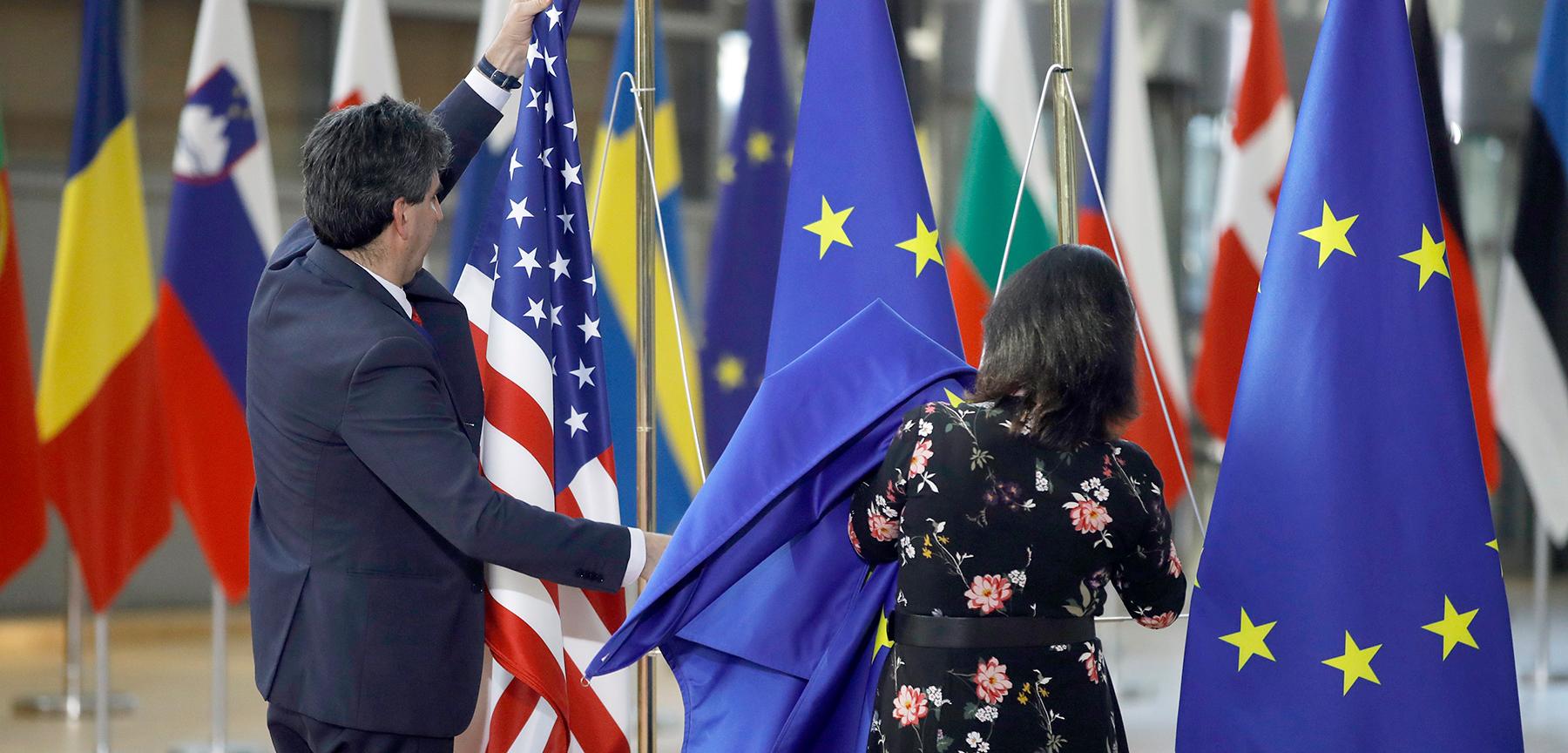The deep political crisis in relations that emerged between Russia and the West after February 2022 has led to large-scale changes in the application of economic sanctions. There was a significant increase in the speed, concentration and scope at which sanctions could be applied to one country. This “Sanctions tsunami” against Russia is a sign of a bifurcation point. Its passage either will launch a reformatting of the world’s balance of power, or alternately, will preserve American hegemony in the global economy and in finance.
Russia amid the current conditions has no choice but to radically restructure the mechanisms of its financial and trade relations with foreign countries. Strictly speaking, the ability of Russia and its partners to achieve such a result will reveal the cracks that exist in the current system of American leadership. A negative outcome from such a bifurcation point will be the marginalisation of Russia in world finance and trade to the level of the DPRK or Iran, while other large non-Western players, even Russia's closest allies, maintain close integration into the US-centric system. A positive outcome would be the restructuring of global finance, which would give way to the formation of an alternative hub like China’s or several such hubs. Such a scenario would give Moscow a wider field for manoeuvre and boost the diversify of its foreign economic relations.
The deep political crisis in relations that emerged between Russia and the West after February 2022 has led to large-scale changes in the application of economic sanctions. There was a significant increase in the speed, concentration and scope at which sanctions could be applied to one country.
At first glance, the policy of sanctions is a narrow and even technical issue. Financial, trade, transport and other restrictive measures are just one of the tools for major powers to achieve their political goals. However, the transformation of sanctions, as a tool, provides an idea of much broader changes in the modern economy under the influence of political risk. This “Sanctions tsunami” against Russia is a sign of a bifurcation point. Its passage either will launch a reformatting of the world’s balance of power, or alternately, will preserve American hegemony in the global economy and in finance.
After the end of the Cold War, the United States was able to consolidate its role as the undisputed leader in world finance. The American dollar is still the most popular means of making international payments, and US financial institutions are the hubs of global financial transactions. A side effect of this leadership was the ability of US authorities to trace financial ties around the world. Since the early 2000s, against the backdrop of the fight against international terrorism, Washington has consistently increased its ability to control financial transactions, stopping them where the issue concerned national security. Thus, blocking financial sanctions and the freezing of assets of foreign individuals became widespread.
A similar tool had existed before; but US leadership in global finance has greatly enhanced its effectiveness. Along with terrorists, other people are increasingly being included in the lists of blocked persons. Few people doubted the expediency of blocking international criminals, drug dealers or WMD manufacturers. But the list of blocked individuals began to be massively replenished for more controversial reasons. Blocking sanctions were increasingly used to deter hostile states. Given the globalisation of world finance and American leadership, Washington's blocking sanctions have become tantamount to deletion from the usual international transactions. Targeted or “smart” sanctions against individuals or companies have proven to be extremely damaging. For example, blocking the backbone companies of a particular target country could lead to huge losses, as happened in the case of sanctions against the oil and gold sectors in Venezuela or on the oil industry in Iran. Blocking financial sanctions were also combined with more familiar sanctions instruments, including export or import bans.
It would seem that the rapid economic growth of China and the European Union should have interfered with US leadership and reduced the severity of sanctions. However, it turned out that the size of a given economy is not commensurate with possibilities for using it for political purposes. Neither the European Union nor China have yet been able to catch up with the United States in terms of the scale of application of restrictive measures. To date, only the United States has been able to create a sanctions machine that operates globally, including the application of extraterritorial (secondary) sanctions and a broad interpretation of American jurisdiction. For example, US authorities apply financial penalties and even criminal prosecution for dollar transactions with persons under sanctions, even against foreign individuals and organisations.
Over the past 12 years, EU financial institutions have paid more than $5 billion in fines to the US regulator for violating US sanctions. The EU itself is building up its sanctions capabilities by actively using blocking financial sanctions. The UK has also been very active since it left the EU. Britain often imposes sanctions as part of a coalition. Other Western economies mirror the measures the UK takes - Switzerland, Japan, Australia, etc.
Russia became a major target for sanctions in 2014. However, until 2022, their volume was relatively modest. The 2019 IMF report recorded that sanctions had slowed down the growth of the Russian economy by only 0.2% per year, and their role is incomparable with oil prices and the regulatory policy of the Russian authorities themselves. The situation changed dramatically after the start of the military operation in Ukraine. Over the past months, the United States and its allies have used almost all possible sanctions against Russia. Large banks and industrial enterprises have been hit by blocking sanctions. Russian financial reserves and the property of Russian citizens worth hundreds of billions of dollars have been frozen. It is forbidden to supply a wide range of goods and services to Russia, including electronics and industrial equipment. Prohibitions have been introduced on the import of Russian oil and oil products, and restrictions have been imposed on its transportation to third countries. The sanctions affect Russian coal, gold, ferrous metallurgy products and much more, including transport restrictions.
A significant number of non-Western countries have refused to implement the sanctions against the Russian Federation. However, businesses in many of these countries are afraid to violate US sanctions for fear of administrative or criminal prosecution by US authorities. A recent example is the mass suspension by banks in friendly countries of cooperation with Russia’s Mir payment system.
Despite the colossal damage from the sanctions, the Russian economy has shown a high threshold of stability. The authorities have managed to maintain financial stability. Export deliveries are being redirected to Asian markets. Critical imports are being replaced with substitutes from friendly countries. Russian business is actively exploring the niches of Western firms that have left the country. The process hasn’t gone smoothly everywhere, and it is far from always possible to replace assets that are being disposed of with adequate analogues. However, the very system of life under sanctions is being consistently built and has a real chance of stability.
It will be critically important for Russia to arrange payments in alternative currencies to the dollar and the euro. The Chinese yuan has become the most sought-after option. The main reason is the volume of the Chinese market and the high density of Russian-Chinese trade. In addition, China itself is increasingly the target of US sanctions. In recent years, Beijing has been energetically pursuing technological independence from foreign countries. Sanctions on major Chinese telecommunications companies are only fuelling China's efforts. The creation of channels of financial and trade relations with Russia independent of foreign players will be the first major precedent for an alternative mechanism of economic relations involving two major powers. However, here, too, one should hardly expect quick and guaranteed breakthroughs. A large number of Chinese companies operate in Western markets and do not want to lose them because of Russia. Moreover, the volume of the Russian market is much smaller. The same logic applies to Russian partners in India and many other friendly countries. Building new connections will take time and considerable effort.
The success of such efforts is not guaranteed, although Russia amid the current conditions has no choice but to radically restructure the mechanisms of its financial and trade relations with foreign countries. Strictly speaking, the ability of Russia and its partners to achieve such a result will reveal the cracks that exist in the current system of American leadership. A negative outcome from such a bifurcation point will be the marginalisation of Russia in world finance and trade to the level of the DPRK or Iran, while other large non-Western players, even Russia's closest allies, maintain close integration into the US-centric system. A positive outcome would be the restructuring of global finance, which would give way to the formation of an alternative hub like China’s or several such hubs. Such a scenario would give Moscow a wider field for manoeuvre and boost the diversify of its foreign economic relations.
First published in the Valdai Discussion Club.






